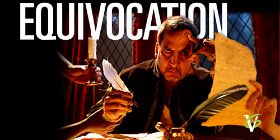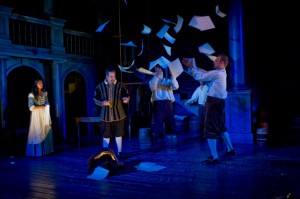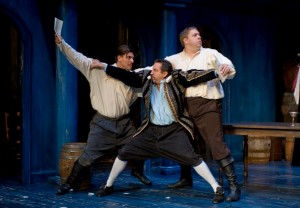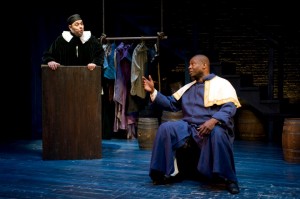NOTHING EQUIVOCAL ABOUT IT
In Bill Cain’s entertaining, stimulating Equivocation, William Shakespeare (spelled Shagspeare in the play) doesn’t radiate awe-inspiring genius. Instead, he’s a regular guy with a considerable talent for writing commercial plays for his acting company, but he faces a problem that may endanger his career, if not his life. Cain’s play deals with heavyweight issues in a literate, intelligent, and challenging manner. It’s also very accessible, if somewhat overlong, with the characters talking in colloquial modern language; the play gets “Shakespearean” only when the characters act out scenes from King Lear and Macbeth.
The action takes place in 1605 when Robert Cecil delivers an ultimatum to the Bard. Cecil is a cool, ruthless henchman for the new English king, James I. Cecil orders Shakespeare to write a play about the Gunpowder Plot that will make the monarchy look good and unite the country. The Gunpowder Plot was an alleged conspiracy by disaffected Catholics to blow up the Houses of Parliament, in hopes of killing the royal family and the court (the plot was betrayed through an anonymous letter to the king, and is still commemorated today as a national holiday called Guy Fawkes Day, named after one of the alleged conspirators).
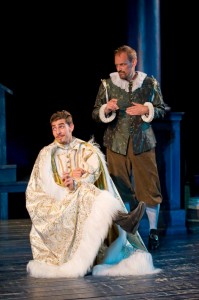 Shakespeare refuses the king’s commission. He sees no dramatic value in the story and after preliminary investigation, decides it’s questionable that the plot ever existed. But one doesn’t say “No” to James I or Robert Cecil. So Shakespeare is impaled on the horns of a dilemma—write a play that is nothing more than an exercise in royal propaganda, or write a play that carries the ring of truth, with probable dire consequences for the author. It’s an agonizing choice between selling out for political and personal expediency, or being true to himself morally and artistically.
Shakespeare refuses the king’s commission. He sees no dramatic value in the story and after preliminary investigation, decides it’s questionable that the plot ever existed. But one doesn’t say “No” to James I or Robert Cecil. So Shakespeare is impaled on the horns of a dilemma—write a play that is nothing more than an exercise in royal propaganda, or write a play that carries the ring of truth, with probable dire consequences for the author. It’s an agonizing choice between selling out for political and personal expediency, or being true to himself morally and artistically.
Cain’s script is filled with ideas that will churn the audience’s mind. The best parts of Equivocation trenchantly and eloquently explore the nature of truth. It turns out there are many “truths”—political, religious, artistic—depending on the eye of the beholder. The author injects plenty of humor into the high tension verbal exchanges so Equivocation never lapses into an academic debate.
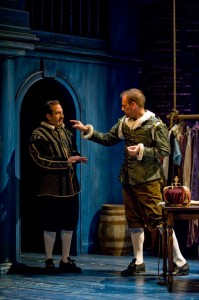 The play takes place in both Shakespeare’s playhouse and a prison / torture chamber where the king’s men attempt to extract confessions from the possible conspirators, the chief one being a crafty and wise Jesuit named Henry Garnett. The play calls for five actors, plus an actress who plays Shakespeare’s daughter, Judith. Four of the actors play multiple roles, shifting the narrative from the playhouse to the larger political stage within the prison walls. Identities are changed in the blinking of an eye, yet the audience is never confused about who is who or what is transpiring.
The play takes place in both Shakespeare’s playhouse and a prison / torture chamber where the king’s men attempt to extract confessions from the possible conspirators, the chief one being a crafty and wise Jesuit named Henry Garnett. The play calls for five actors, plus an actress who plays Shakespeare’s daughter, Judith. Four of the actors play multiple roles, shifting the narrative from the playhouse to the larger political stage within the prison walls. Identities are changed in the blinking of an eye, yet the audience is never confused about who is who or what is transpiring.
The title suggests the relativism of the issues Cain places on the table for his characters to wrestle with. The dictionary definition of equivocation is “the use of expressions with double meanings in order to mislead.” It’s also a Catholic doctrine allowing priests to lie during questioning when their lives are at stake. Shakespeare found the term dramatically useful, employing it in Macbeth: “I begin to doubt the equivocation of the fiend that lies like truth”—this is certainly one of the meatiest lines in the entire Shakespearean canon.
At the Victory Gardens, Marc Grapey is a superb Shakespeare, not the literary deity he would become after his death but an audience-high man suddenly enmeshed in a very stressful situation. He also has to work among the feisty personalities and egos of his cohorts Richard Burbage (Bruce Young), Robert Armin (Matt Kahler), and Richard Sharpe (Arturo Soria), as well as report to the menacing Robert Cecil (Mark Montgomery). Judith (Minita Gandhi) is a young woman who dislikes the theater, finds Shakespeare’s soliloquys silly, and likely resents her father’s dismissive attitude toward her while he grieves over the death of his son and her brother.
Among the supporting performances, Mr. Montgomery is perhaps first among equals for his Machiavellian, droll performance as Robert Cecil, a bad guy who steps out of the play’s chronology to inform the audience that as nasty as he may be, his descendants have played a central role in English political life to the present day. Mr. Young is stalwart as Richard Burbage and the Jesuit Henry Garnett, who is shrewd, dignified, witty and—as his life comes to an end—a little fearful. Ms. Gandhi hovers on the fringes of the story until she has her say near the end, when she gives her articulate take on her father and his theater. Mr. Soria moves convincingly from temperamental actor to sympathetic prisoner to the mincing James I.
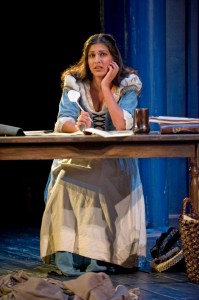 Under Sean Graney’s directing, the outstanding performances serve the play handsomely. Graney has carved out an estimable local reputation in Chicagoland theater for directing edgy, experimental plays. Equivocation is a comparatively traditional work, but Graney orchestrates the multiple characters and themes with dexterity and clarity. William Boles has designed a flexible set that creates appropriate environments the play’s several locations. Janice Pytel designed the period costumes. Heather Gilbert designed the lighting and Kevin O’Donnell the sound.
Under Sean Graney’s directing, the outstanding performances serve the play handsomely. Graney has carved out an estimable local reputation in Chicagoland theater for directing edgy, experimental plays. Equivocation is a comparatively traditional work, but Graney orchestrates the multiple characters and themes with dexterity and clarity. William Boles has designed a flexible set that creates appropriate environments the play’s several locations. Janice Pytel designed the period costumes. Heather Gilbert designed the lighting and Kevin O’Donnell the sound.
Cain deftly weaves together the complex threads of his narrative, notably the shifts between the intramural conflicts within the acting company and the Shakespeare’s interviews with the allegedly conspirators (they would be called terrorists today). But Cain’s canny dramaturgy doesn’t fully disguise the fact that his play is too long, especially in the second act. Much of the act is consumed with the performance of scenes from Macbeth that are anti-climactic after all the previous intellectual fireworks. About 20 minutes of blue penciling would tighten the script positively.
photos courtesy of Victory Gardens
Equivocation
Victory Gardens Biograph Theater, 2433 N. Lincoln Ave.
ends on October 14, 2012
for tickets, call 773.871.3000 or visit Victory Gardens
for more shows, visit Theatre in Chicago
